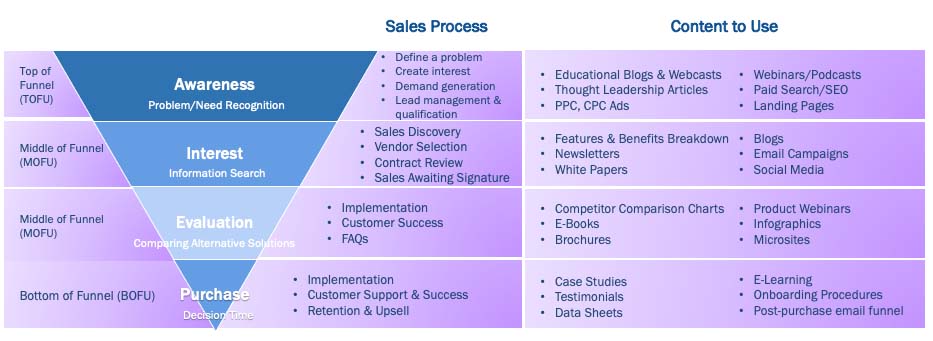The Difference Between Content Marketing and Content Selling
I’m often asked about the difference between marketing content (used for content marketing) and sales content (used for content selling). While setting a marketing strategy, many of my clients confuse the two and intermix them into a stew of content schemes that wind up confusing the audience and driving away business. While both forms of content are extremely valuable, they both certainly have their own place within the buyers’ journey and sales cycle. In fact, sales content should be a significant part of any successful marketing strategy. The two categories are significant parts of the sales and marketing process and greatly affect your efforts to attract buyers and close deals. Let’s break them down.Content Marketing
Content marketing is the act of producing and distributing valuable, relevant marketing content with the intent to attract, acquire, and engage a specific audience. Its purpose is to gain company exposure and establish it as an industry thought leader. It’s most effective in the awareness and interest stages of the journey and should be charming, informative, and display the type of products and solutions you offer, how they fit in the marketplace and show the kind of organization you’re building. The content here should cover a wide range of topics and address broader industry trends. It’s shared in newsletters, blogs and on social media (LinkedIn for B2B and Facebook and Instagram for B2C). Did I say, thought leadership? Marketing Content Consists of: • Educational Blogs and Webcasts • Thought Leadership Articles • Features and Benefits Breakdown Charts • Webinars and Podcasts • Landing Pages • White Papers • Case Studies • Blogs
Content Selling
Content Selling is the act of producing and distributing materials that focus on a more specific buyer persona and customer need. It’s created with sales in mind rather than information and storytelling. Its intent is to convince prospects and leads that your product and solution is the best for their business. It has more detailed information regarding features, benefits, and solutions your product or service provides – think data sheets, case studies and testimonials. The materials are used when a lead reaches the evaluation and purchasing stages of the journey. It’s shared when a salesperson has had a meeting with a lead and is close to making an agreement. Think of content selling as sales enablement, it helps your salespeople close more deals.
Sales Content Consists of:
• Data sheets
• Success stories
• Competitor Comparison Charts
• E-Books
• Brochures
• Product Webinars
• Infographics
• Microsites
• Case Studies
• Award announcements
• Testimonials
• Onboarding Procedures
Marketing content and sales content should flow smoothly and tell the story of your business, your products and services, the features and benefits to convince buyers you’re the best solution for their business. It’s crucial to align sales and marketing teams in all efforts to produce this both types of content. Marketing should meet regularly with sales to better understand the questions they’re getting from prospects, the objections they’re getting from leads and the problems they’re hearing in the marketplace. That way, marketing can distribute accurate information and tell the right stories to attract more potential buyers.
Marketing must also meet regularly with product production and engineering as well as onboarding and customer service, so they precisely understand how and why the product is made, how it’s implemented and how it’s supported. By having marketing align with all departments, marketers can create the most effective content for each stage of the buyer’s journey and the sales cycle – from first touch, to closed deal, to onboarding and customer service.
While content marketing and content selling have differences in the information they convey and the intent of their delivery, the two go hand-in-hand in any effective marketing strategy. Content marketing is used to bring prospects to a meeting, while sales content is used to close more deals. Either way, the ultimate goal is to sell more products and services, and if the two are utilized properly, your organization can win more business.
About DCS
Digital Consulting Services (DCS) specializes in assisting small, medium-sized, and startup businesses with demand generation and operates with modern marketing and sales strategies and tactics.
Digital Consulting Services fills the gaps in existing marketing and sales strategies and operations, and we help execute full-service campaigns that include:
- Sales and Marketing Strategies
- Database Research and Customer Segmentation
- Marketing Automation and CRM Systems Integration
- Demand and Lead Generation
- Lead Scoring and Qualification
- Deal Closing
To learn more about how we can help you grow your business and see if we’re a good fit for your business, visit our Services Page page that details approach. Or feel free to contact us for free initial consultation to see if our approach is the right fit to help you build your business.
